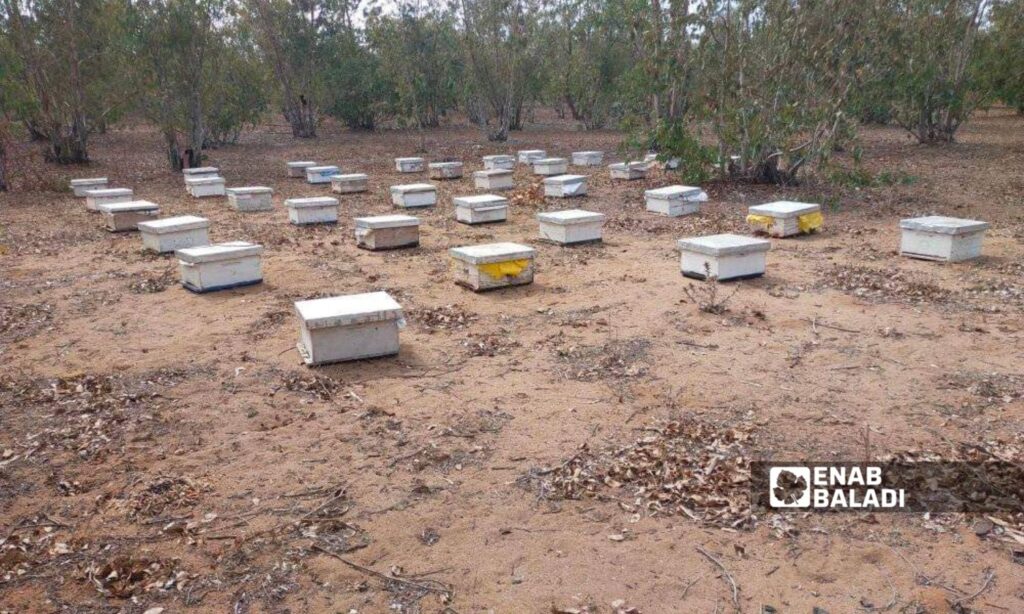Quneitra – Zain al-Joulani
Honey production in Quneitra, southern Syria, has declined over the past two years, and this year’s beekeeping season was not like the previous ones. Last year’s production was also lower than before, which has resulted in reduced profits for beekeepers in the province, according to statements made to Enab Baladi by local beekeepers.
During the current season, beekeepers focused their harvest on two types of honey: “Thistle” and “Anise.” None of them managed to harvest spring honey, locally known as “Nafl,” which is considered to be high quality.
Beekeepers attributed the decline in honey production and quality to climate change, along with weather factors, high prices for raw materials required for beekeeping, and the lack of suitable pastures for the bees. Additionally, rising fuel prices and the inability to move between provinces due to security issues have contributed to the challenges.
A bee hive frame containing wax and honey in Quneitra province – October 16, 2024 (Enab Baladi/Zain al-Joulani)
Production is declining
Mohammad Yasin, a beekeeper from the town of Ofania in northern Quneitra, who has been in the beekeeping business for ten years and owns about 60 beehives, reported that his losses have been increasing over the years.
The beekeeper mentioned to Enab Baladi that weather conditions have had the greatest impact on the decline in honey production.
He added that rising temperatures and an early summer have led to an early end to the spring season, preventing beekeepers from collecting “Nafl” honey, and he was unable to catch up with the swarming season.
Swarming is the natural method of honeybee reproduction, which usually occurs in the spring or the season of abundance, or when a bee colony is at its full strength and in the best of conditions.
The beekeeper told Enab Baladi that after hard work and transitioning from one season to another, his beehive managed to produce 400 kilograms of “Anise” and “Sum,” but this amount was not good compared to previous years.
For his part, Youssef Jaber, a beekeeper with 40 years of experience in beekeeping, stated to Enab Baladi that his profession no longer suffices as a means of living, and those working in the field need to seek alternative sources of income.
Jaber attributed the decline of the profession to rising fuel prices, which have naturally increased transportation costs that workers in the field rely on to move bees to different areas and seasons within Syria.
He added that the high prices of medicines, vitamins, wood, and even wax are also significant factors affecting the income of those in the field, coupled with the low price of honey which does not match the family’s financial needs.
According to Jaber, the lack of a market for selling or exporting honey is one of the main reasons for financial losses, as well as the spread of diseases and epidemics that have harmed beekeepers and inflicted financial losses.
No government intervention
For his part, Mohammad, an engineer specializing in beekeeping residing in Quneitra province, stated that beekeepers in the area have lost part of their hives due to cold weather and diseases, with no effective intervention from the responsible government bodies.
The engineer working in the Quneitra Agriculture Directorate said that the Beekeepers Association demands every year that the Ministry of Agriculture and the Syrian Beekeepers Association compensate the beekeepers, and the latter organizes schedules, but does not take any practical steps.
Ali al-Shahabi, a beekeeper from southern Quneitra, also criticized the activity of the Syrian Arab Red Crescent (SARC) organization in supporting beekeepers. He mentioned that the organization launches projects to support beekeepers, distributing beehives, frames, wax, pollen traps, beekeeper suits, and other tools, but the distribution mechanism relies on “favoritism and connections.”
According to al-Shahabi, no old beekeepers received this support and they are forced to buy their needs periodically.
On October 15, the director of agriculture in Quneitra, Rifaat Moussa, stated that the number of registered beekeepers in the beekeeping division of the directorate and the Beekeepers Association in Quneitra reached 800 beekeepers, and the number of beehives in the province is 9,296. He indicated that the expected honey production for this season is 46 tons.
He added, according to the official website of the General Union of Peasants, that the Agriculture Directorate is working on producing local Syrian queen bees, breeding them, and selling them to beekeepers at symbolic and encouraging prices, as part of the ministry’s plan to restore the beekeeping profession to its former glory in Quneitra.

